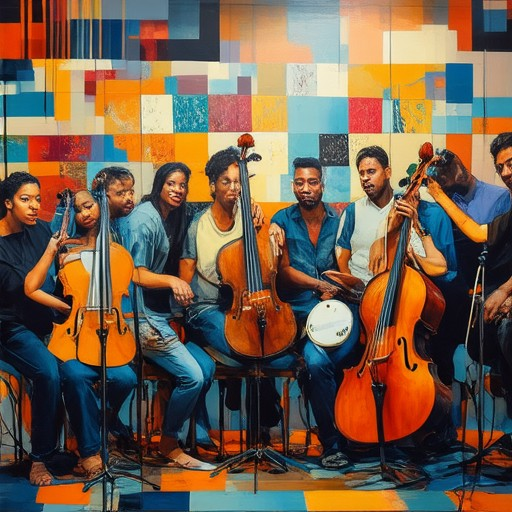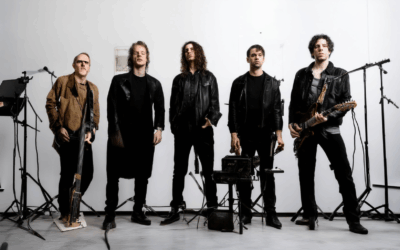Starting a band is an exhilarating journey filled with creativity, determination, and a dash of uncertainty. Whether you’re a teenager, a kid, or someone considering starting later in life, there’s no shortage of tips to guide you through the process. From understanding how to prepare for your first practice to exploring the possibilities of forming a band with no prior experience, this guide offers invaluable insights for aspiring musicians of all ages. Discover how to navigate the challenges of starting a band, learn from success stories of musicians who found their groove later in life, and gain practical advice for keeping your band motivated and successful. With tips tailored to beginners, this article is your ultimate resource for turning your musical dreams into reality.

How to Start a Band as a Beginner
Starting a band can be an exciting journey, but it requires careful planning and dedication. Here’s a step-by-step guide to help you get started:
- Find Like-Minded Musicians
- Join online forums or communities dedicated to music enthusiasts, such as Reddit’s r/Guitar or r/MusicProduction.
- Post on local community boards or classifieds to connect with others interested in forming a band.
- Attend open mic nights or local music events to network with potential bandmates.
- Choose a Genre and Style
- Decide on a musical genre that aligns with your interests, whether it’s rock, pop, jazz, or something else.
- Research popular bands in your chosen genre for inspiration and guidance.
- Practice and Develop Your Skills
- Set regular practice sessions to perfect your instruments and vocal skills.
- Experiment with different sounds and styles to find your unique vibe.
- Write Original Songs
- Start composing your own songs to showcase your creativity and personality.
- Consider collaborating with other members to inspire each other’s songwriting.
- Record Your Music
- Invest in quality recording equipment or hire a professional to capture your sound.
- Use DIY recording tools like GarageBand or Logic Pro to create polished tracks.
- Build a Fanbase
- Create social media profiles for your band on platforms like Instagram, Facebook, and Twitter.
- Share your music on streaming platforms like Spotify, Apple Music, and YouTube.
- Engage with fans and other bands by commenting on posts and collaborating.
- Host Live Performances
- Organize small gigs at local venues or house parties to build your reputation.
- Collaborate with other bands to increase attendance and exposure.
- Promote Your Band
- Distribute flyers and posters in your local area to promote your shows.
- Use social media to share updates about your progress and upcoming events.
- Partner with local businesses or event organizers to host larger performances.
- Stay Persistent and Adapt
- Understand that building a successful band takes time and effort.
- Be open to feedback and willing to adapt your style and approach.
Remember, starting a band is about collaboration and growth. Surround yourself with talented individuals who share your passion and work together to create something amazing. Good luck!
How to Prepare for Your First Band Practice
To ensure a successful and productive first band practice, follow these essential steps:
- Learn the Music: Familiarize yourself with the songs scheduled for practice. Practice individually beforehand to master your part.
- Check Gear: Verify that all instruments and equipment are in working condition. Confirm with other members about their gear needs.
- Confirm Timing and Location: Check the practice time, location, and layout. Set a tentative schedule and ensure the space is set up appropriately.
- Nutrition and Hydration: Bring water bottles and light snacks. Eat a nutritious meal before practice to boost energy levels.
- Arrive Early: Plan to arrive 30 minutes early to set up and warm up. This allows time for any last-minute adjustments and ensures punctuality.
- Stay Focused During Practice: Maintain active listening and be ready to contribute. Take turns playing solos or sections to enhance individual and group performance.
- Encourage Feedback: Create a supportive environment by sharing constructive feedback and ideas. This fosters growth and collaboration.
- Clean Up Post-Practice: After practice, clean the space thoroughly. Pack up gear carefully to avoid damage. Designate someone to manage this task.
- Maintain a Positive Attitude: Keep morale high. Focus on improvement rather than perfection to maximize the benefits of practice.
By following these guidelines, you’ll be well-prepared to make the most of your first band practice and set a strong foundation for future rehearsals.

Starting a Band Without Experience: A Step-by-Step Guide
Forming a band without prior experience is achievable with dedication and teamwork. Here’s how you can get started:
- Determine Your Style and Goals
- Decide on the genre (rock, pop, jazz, etc.) that suits your interests.
- Discuss with potential members to align musical preferences and goals.
- Assemble Your Band
- Recruit like-minded individuals, whether friends or strangers with similar interests.
- Keep the initial lineup small for easier management and focused rehearsals.
- Acquire Instruments
- Start with basic instruments like guitars, drums, and a microphone.
- Share or rent instruments if possible to minimize costs.
- Find Rehearsal Space
- Use a quiet, accessible location like a garage or spare room.
- Schedule regular rehearsal sessions to maintain momentum.
- Choose a Band Name
- Pick a memorable name that reflects your music style or personality.
- Consider names like “The Garage Band” or “EchoWave” for a unique touch.
- Build Your Brand Identity
- Create a distinctive logo and branding materials.
- Take professional photos or DIY visuals to showcase your identity.
- Set up social media profiles on platforms like Facebook and Instagram.
- Practice and Develop Your Sound
- Learn and perform cover songs to build your repertoire.
- Experiment with original compositions to develop a unique style.
- Be patient and focus on improvement rather than perfection.
- Start Performing
- Play at local events, house parties, or open mic nights.
- Contact local venues or promoters for gig opportunities.
- Record Your Music
- Collaborate with friends or professionals for recording sessions.
- Seek out local studios or borrow equipment for a DIY approach.
- Release tracks online to build your discography.
- Become a Part of the Music Community
- Attend local music events and festivals to network.
- Connect with other bands through social media or local scenes.
- Swap promotional materials with fellow musicians.
- Stay Motivated and Organized
- Set short-term goals and celebrate achievements.
- Document your journey and progress to stay inspired.
- Keep all band-related information organized digitally or physically.

Is 25 Too Old to Start a Band?
No, 25 is not too old to start a band. In fact, your mid-20s can be the perfect time to pursue your musical passions.
Why 25 is a Great Age to Start a Band
- Maturity and Life Experience: At 25, you’ve gained valuable life experience, which can translate into better decision-making and understanding of your goals.
- Stable Lifestyle: Many people in their mid-20s have established themselves in their careers or personal lives, allowing for more flexibility to commit to a band.
- Networking Opportunities: You’re likely to have a stronger professional and social network, which can help in promoting your band and connecting with other musicians.
- Musical Growth: By 25, you may have honed your skills through years of practice, making you a more capable musician.
How to Succeed as a Band Member Over 25
- Find Your Niche: Identify a genre or style that resonates with you and explore it deeply. Whether it’s rock, pop, jazz, or something else, consistency is key.
- Build a Strong Network: Connect with local musicians, join online communities, and attend music events to meet like-minded individuals.
- Invest in Quality Gear: While you don’t need the most expensive equipment, invest in reliable instruments and tools to ensure your sound is professional.
- Stay Persistent: The music industry is competitive, so stay committed and open to feedback. Practice regularly and be willing to adapt your style.
- Balance and Time Management: Manage your time effectively to balance your personal life with music-related activities. Set realistic goals and priorities.
Remember, there’s no set age limit to achieving your dreams. What matters most is your passion, dedication, and willingness to put in the effort. Whether you’re 25 or 50, the journey of starting a band is about growth, creativity, and connection. So, grab your instruments and let your music shine!
Learn more about our music community and resources for aspiring musicians.
Famous Musicians Who Started Late
Many renowned musicians didn’t wait until their teenage years to pursue their musical careers. Some of the most successful artists in history began their journeys later in life, proving that talent and dedication can thrive at any age.
- Leonard Cohen – The iconic Canadian singer-songwriter began his musical journey at the age of 33. Despite entering the industry later than many of his peers, Cohen crafted a remarkable career, becoming a influential figure in folk and rock music.
- Dave Grohl – The Foo Fighters frontman started his professional career later in life after playing drums for Nirvana. Grohl transitioned successfully into lead vocals and songwriting, leading Foo Fighters to global success.
- Miles Davis – One of the greatest jazz musicians, Davis didn’t gain widespread recognition until he was in his 30s. His groundbreaking work in the 1950s and beyond redefined modern jazz.
- Paul McCartney – Known as one of The Beatles, McCartney started gaining prominence in his mid-20s. His songwriting and vocal contributions were pivotal to the band’s success.
- Alicia Keys – Although she showed early musical talent, Keys didn’t release her debut album until she was 19. Her soulful voice and piano skills made her a standout artist in the music industry.
- Drake – Starting his career in his late 20s, Drake rose to fame with his unique blend of R&B and hip-hop. His storytelling abilities and hit-making prowess have made him one of the most successful artists today.
- Selena Gomez – Gomez began her acting career in her late teens but found significant success as a singer and actress in her 20s. Her versatility in both fields has made her a global star.
- Elton John – John started his music career in his early 20s but achieved massive success in his 30s and beyond. His contributions to pop and rock music are timeless.
These musicians demonstrate that age is just a number when passion and perseverance meet opportunity. Their late starts didn’t hinder their ability to leave a lasting impact on their respective genres and the music world as a whole.
Explore more stories of inspiration and discover how these artists overcame challenges to achieve their dreams. Visit our main website for exclusive content and insights about music and band culture.

At What Age Do Most Musicians Make It?
Musicians often reach success at varying ages, depending on their genre and dedication. While many achieve recognition in their teenage to early twenties, success can also come later in life for some artists.
Teenagers and Young Adults
- Rock and Pop : Many popular musicians find success in their teens or early twenties. Artists like Oedipus Band often see breakthroughs during this time due to their energetic performances and relatable lyrics.
- Classical and Jazz : Musicians in these genres may take longer to gain recognition, often achieving success in their thirties or forties. Their dedication to craftsmanship and artistry often leads to delayed but impactful careers.
Late Bloomers
- Some musicians excel later in life, defying traditional timelines. For example, legendary artists like Bob Dylan and Leonard Cohen found sustained success in their fifties and beyond, proving that age is no barrier to artistic achievement.
Conclusion
While there’s no universal “right” age to succeed, passion, persistence, and talent are key factors. Whether you’re a teenager or a late bloomer, the journey to becoming a successful musician is unique to each individual. Don’t let age limit your ambitions—follow your passion and keep creating. Explore Oedipus Band ‘s resources for tips on navigating your musical journey.



0 Comments